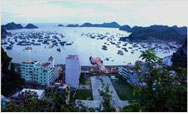You are here » Home » Telling Our Story
Success Story
Apparel companies work together to combat costly legislation
Textile Sector Benefits from Cooperation

| |
Photo: USAID
|
|
A worker at the Kashtan facility assembling clothes in Kyiv, Ukraine.
Cooperation and coordination helped Ukraine’s nascent apparel industry save over $12 million a year.
|
For many Ukrainian apparel manufacturers, assembling clothes for foreign companies under a “cut-and-make” scheme is a way to pay the bills while they develop their own brands. The goal is eventually to compete in Ukraine with established Western brands or Chinese and Turkish imports. Ukrainian law stipulates that under the cut and make model, manufacturers must export the finished goods no later than 90 days after importing cloth and accessories for assembly, or pay import duties and value-added taxes.
In March 2005, new legislation required commercial banks to act as intermediaries between apparel manufacturers and tax authorities and allowed banks to charge up to a 10 percent commission for the service. In practice, for many apparel manufacturers, this meant an end to the slim profit margins they gained from the cut-and-make arrangements.
Kashtan, a Kyiv-based apparel manufacturer, was afraid this new law would threaten the industry’s survival. They turned to USAID for ideas. USAID had been working with the apparel industry for some time, helping businesses develop and sharpen their competitive edge. As a result, industry sales had grown by 5.4 percent and jobs had grown by 10.3 percent. Using its contacts within the industry, USAID began to mobilize stakeholders to work with the government to create a better regulatory environment for business.
USAID helped organize a “We Should Be Heard” campaign for the industry, culminating in December 2005 with a roundtable attended by 48 sector stakeholders, including the Ministry of Industrial Policy and the Ministry of Economy. This was the first time senior policymakers engaged the private sector on this topic. As a result, the Cabinet of Ministers revoked the law on January 21, 2006, saving the apparel industry over $12 million a year. The apparel industry was obviously pleased with the result. Now, Kashtan and similar companies can refocus their efforts on the true task at hand: to become nationally recognized brands.
Print-friendly version of this page (440kb - PDF)
Click here for high-res photo
Back to Top ^ | 

